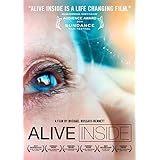
The documentary "Alive Inside: A Story of Music and Memory," which City Drive Films is releasing on DVD and Blur-ray on November 18 2014, nicely demonstrates how IT guy turned social worker Dan Cohen uses music to trigger formerly lost memories in Alzheimer's patients and other folks with cognitive difficulties.
Friends and family members of Alzheimer's patients will relate (no pun intended) to the scenes in which essentially comatose people quickly respond to music that is chosen for them; fanboys will think of the similar integral role that music plays in "Ghostbusters II." One spoiler is that Cohen does not get a toaster to dance.
The scenes in the following clip, courtesy of YouTube, of the trailer for "Alive" perfectly convey the style and substance of this well-made film.
The apt recognition for "Alive" includes winning the Documentary Audience Award at the 2014 Sundance Film Festival, the Best Documentary Award at the Milano International Film Festival, and the Audience Award at the Calgary Underground Film Festival.
Dr. Oliver Sacks, who is best known through the Robin Williams film "Awakenings," briefly explains the science behind music triggering memories; the opening scene in "Alive" in which an elderly woman first expresses an inability to remember much of anything but seems to recall her early life on listening to jazz legend Louis Armstrong singing "When the Saints Go Marching In" shows that Sacks gets it right.
Other case studies include a vegetative old man and a not-so-happy woman perking up and vividly recall happier times of their lives on hearing songs from their respective youths. (The Beach Boys does it for the golden girl.)
One related "inconvenient truth" that "Alive" addresses is a shift in the philosophy regarding caring for infirm elderly people away from residence-style nursing homes to facilities based on hospital models. Another associated "truth" is that these facilities (consistently with much of the general American healthcare system) limit much of the provided care to pouring pills down the mouths of the patients. This practice gives healthcare providers the benefits of keeping the resident members of the "greatest generation" docile without requiring much effort and of obtaining significant revenue through dispensing the drugs.
All of this adds up to "Alive" meeting the oft-repeated Unreal TV standard for a good documentary; it informs and entertains. Anyone with an interest in learning about the seemingly effective music therapy that the film depicts can learn more through the non-profit Music & Memory organization that Cohen heads.
The special features include a Q&A session with Cohen, an interview with "Alive" filmmaker Michael Rossato-Bennett, and an extra that features music from the film.
Anyone with questions or comments regarding "Alive" is encouraged to email me; you can also connect on Twitter via @tvdvdguy.
No comments:
Post a Comment